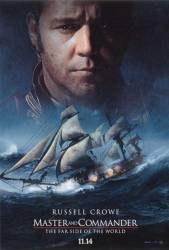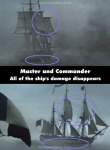Factual error: When the ships go around Cape Horn you see it in the distance. But the rock you see is not Cape Horn. Cape Horn is a 400 metre high rock face. (00:47:25)
Factual error: After Stephen Maturin comes back with a small portion of findings from the Galapagos Islands, he presents a stick insect to Captain Aubrey, but stick insects (Phasmids) don't exist in the Galapagos Islands. (01:41:20)
Factual error: The version of the Lord's Prayer in the burial at sea scene is a more modern version, not from the Book of Common Prayer which would have been used at the time. (02:00:40)
Factual error: At the end of the film, Aubrey sends the de-masted prize Acheron to Valparaiso, Chile, for repairs. Valparaiso is 3,000 miles from the Galapagos Islands, and, in 1805, was a tiny village without appropriate port facilities to dock or repair anything as large as a frigate. Valparaiso did not become a major port until after Chilean Independence from Spain (1810). Guayaquil (in modern Ecuador) would have been a more appropriate choice, being about 750 miles from the Galapagos, and being a major port in 1805. The choice between the two ports was moot, anyway, since both municipalities were Spanish territory in 1805, and thus were allied with the French, and hostile to the British.
Factual error: In the brief shot of the Surprise underway after entering the Pacific, seen from dead astern and from above, the ship is leaving a respectable wake but is not heeling with the wind at all and the sails are hanging slack as though completely becalmed.
Factual error: In the dinner scene, the captain points and asks the doctor which "weevil". Those are actually mealworm larvae (sold as reptile food in most pet stores in the US) and would never have been in a ship's food. Also, they show the doctor catching common green iguanas, which are not native to the Galapagos Islands. Neither is the species of tortoise pictured in the movie.
Factual error: The (authentic) book on Lord Nelson, that Captain Aubrey gives to Midshipman Lord Blakeney, wasn't published until 1806. The film is set in 1805.
Factual error: As the Surprise attempts to weather Cape Horn, the wind backs westerly, so Aubrey gives the order to steer South. As the command is passed to the helmsman, he spins the wheel to the left - which would point the vessel Northerly, since the wheel would be turned in the opposite direction.
Factual error: When performing the burials at sea after the final fight with the Acheron, the body on the plank is covered with the wrong ensign. The one shown is not the Union Jack created after the 1800 Act of Union. The correct ensign would be the flag of Great Britain, which does not have the saltire of St. Patrick (the diagonal red "X").
Suggested correction: The story takes place in 1805; the Union Jack is therefore absolutely correct.






